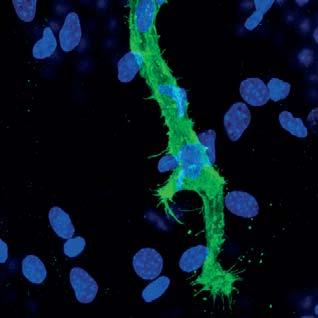
3 minute read
The leading expert in the tumour microenvironment
by 5rXobdlLrFp
Laboratory of Tumour and Development Biology (LBTD) GIGA-Cancer The leading expert in the tumour microenvironment
With the 30 years of experience in fundamental and translational research of Profs. A. Noël (PhD in Biology) and D. Cataldo (Physician and PhD in Biomedical Sciences), the LBTD has some fifty people including 5 PIs and twenty doctoral students. Its objective is to contribute to the understanding of disease mechanisms to further personalise treatments and to discover new medicines.
Advertisement
LBTD has developed recognised expertise in the area of the tumour microenvironment and its interaction with tumour cells until the possible emergence of metastases. Its researchers share their experimental models and expertise to better analyse the different stages in the progression of a tumour and their remote dissemination. The aim is to better understand the influence of the microenvironment on tumour cells for the purpose of developing drugs that directly interact with the microenvironment.
aggressive. Furthermore, they express the receptors of EGF for which treatments exist that are not used in this particular case of cancer. The laboratory work carried out with clinicians suggests that the expression of two additional markers could be able to predict the effectiveness of these treatments. These data still need to be validated by appropriate preclinical and clinical trials in order to arrive at a personalised treatment or even a new drug.

Several aspects are studied: formation of blood vessels (angiogenesis), formation of lymph vessels (lymphangiogenesis), circulating tumor cells, chronic inflammation and fibrosis resulting from excessive accumulation of the extracellular matrix. As regards lymphangiogenesis and the process of metastatic dissemination, the LBTD’s work focuses on the extension of tumour cells to the lymph nodes and subsequently to other organs (lungs etc.), within pre-metastatic niches: these tumour cells in fact prepare their arrival by remotely sending information to the lymph nodes and the lungs. There is an opportunity to remotely block this dialogue in order to prevent nesting and the creation of an environment permissive for tumour cells. In this context, researchers are conducting a clinical trial on cervical cancer: in collaboration with clinicians and gynaecologists, they are focused on finding markers of pre-metastatic niches in the lymph nodes. Today, LBTD faces a tremendous technological challenge: the processing of massive amounts of data originating from RNA sequencing technologies. To meet this challenge, it plans to integrate into its team top-class bioinformaticians capable of transposing and validating these data at the clinical and fundamental levels. Another big challenge is of a more strictly medical nature: while a large number of effective treatments is available, they should be combined to obtain an increasingly personalised treatment, dispensed at the right time and adapted to each patient and to the development of each tumour. A great opportunity for the researchers at LBTD! Overlay projections © LBTD
The researchers are also studying the influence of hormones and air pollution on the behaviour of tumour cells in lung cancer. They also analyse how tumour cells circulating in the blood can colonise organs to form metastases. In addition, they use various state-of-the art techniques aimed at understanding the particular metabolism used by tumour cells with a view to attempting to disrupt the tumours’ energy production source.
LTBD has developed numerous research collaborations with Prof. F. Kridelka (gynaecologist specialising in cervical cancer), M. Nisolle (gynaecologist specialising in hormonal climate), J.-L. Nizet (microsurgery for the transfer of lymph nodes in the experimental stage) and G. Jérusalem (medical oncology). The collaboration with the latter pertains to so-called triple-negative breast cancers, which are characterised by the absence of three hormone receptors: oestrogen, progesterone and HER2. These cancers, which often affect young females, are particularly
The LBTD team

Laboratoire de Biologie des tumeurs et du développement (LBTD) GIGA-Cancer Avenue de l'Hôpital 11 - B-4000 Liège Tel.: +32 (0)4 366 25 69 E-mail: agnes.noel@uliege.be https://www.giga.uliege.be










